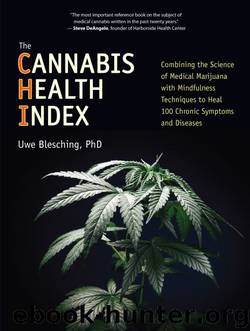The Cannabis Health Index by Uwe Blesching

Author:Uwe Blesching [Blesching, Uwe]
Language: eng
Format: epub, mobi
Tags: OCC000000 Body, Mind & Spirit / General
ISBN: 9781583949634
Publisher: North Atlantic Books
Published: 2015-10-15T22:00:00+00:00
Cannabis and Depression
Cannabinoids have proven effective in laboratory studies and rodent tests for antidepressant activity. These effects appear to share a similar mechanism of action as current antidepressant drugs such as the selective-serotonin reuptake inhibitors (SSRIs). Human trials have confirmed the antidepressant effects and mood-elevating properties of cannabis.
More specifically, in both a Tulsa study2 (1995) and an experiment from Miami3 (2002), researchers discovered that cannabinoids might play a therapeutic role in improving mood and reducing signs of depression. In 2005, an international team of scientists examined the impact of a potent synthetic cannabinoid (HU210) in an experiment on rats. Most illegal substances have been reported to decrease the growth of new nerve cells in the hippocampus. However, chronic HU210 treatment promoted neurogenesis in the hippocampal regions of the study rodents and appeared likely to produce both an anxiolytic and antidepressant-like effect.4
A Vancouver study (2007) confirmed the potential antidepressant effect of cannabinoids; specifically, enhanced CB1 activity in the hippocampus region of the brain produced an antidepressant-like effect in rats.5 Scientists from Montreal, Canada (2007) lent further support for the hypothesis that cannabis modulates moods and possesses antidepressant-like properties via CB1 receptors.6
A Boston trial (2009) involved data collected from 775 patients living with HIV/AIDS and the manifestation of depression. Results revealed that cannabis was more effective in treating depression when compared with standard prescription and over-the-counter medications given for the same condition.7
Scientists from São Paulo, Brazil (2010), conducted a review of available studies on two cannabinoids (CBD and THC) and their impact on the psychiatric patient. Cannabidiol showed a therapeutic tendency as an antipsychotic, anxiolytic, and antidepressant, while THC emerged as a potential adjuvant in the treatment of schizophrenia.8 In addition, an Oxford, Mississippi, experiment demonstrated that THC exerted antidepressant-like actions and “thus might contribute to the overall mood-elevating properties of cannabis.”9
Download
This site does not store any files on its server. We only index and link to content provided by other sites. Please contact the content providers to delete copyright contents if any and email us, we'll remove relevant links or contents immediately.
Inner Engineering: A Yogi's Guide to Joy by Sadhguru(6778)
The Power of Now: A Guide to Spiritual Enlightenment by Eckhart Tolle(5735)
Fear by Osho(4723)
Ikigai by Héctor García & Francesc Miralles(4224)
The Art of Happiness by The Dalai Lama(4117)
The Ultimate Bodybuilding Cookbook by Kendall Lou Schmidt(3921)
Yoga Therapy by Mark Stephens(3736)
The Little Book of Hygge by Meik Wiking(3673)
The Healing Self by Deepak Chopra(3559)
Why Buddhism is True by Robert Wright(3436)
The Hatha Yoga Pradipika (Translated) by Svatmarama(3311)
Being Aware of Being Aware by Rupert Spira(3263)
Shift into Freedom by Loch Kelly(3187)
Wild Words from Wild Women by Stephens Autumn(3132)
Work Clean by Dan Charnas(3105)
Happiness by Matthieu Ricard(3031)
More Language of Letting Go: 366 New Daily Meditations by Melody Beattie(3015)
Yoga Body & Mind Handbook by Jasmine Tarkeshi(2861)
Why I Am Not a Feminist by Jessa Crispin(2736)
